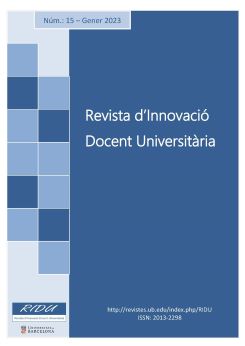Biochemistry’s knowledge reinforcement by using simple letters’ or words’ games
DOI:
https://doi.org/10.1344/RIDU2023.15.3Keywords:
Biochemistry learning, High education, Self-learning, Gamification, Science languageAbstract
Introduction and problem: Games are highly appreciated by general population, so we decided to search several games in order to use them to reinforce the knowledge in biochemistry of students from the Chemistry Degree of the University of Barcelona. The puzzle book games are based on two possibilities: numbers and letters. Among the letters’ games the most frequent are crossword, self-defined crosswords, crossword puzzles and word search puzzles. Methodology: To reinforce students’ knowledge in Biochemistry, we performed a search for word games based in those used in language grammar learning, to then adapt them to the nomenclature and structure of biomolecules in Biochemistry. Following a behaviorist approach, we applied the model of Dick and Carey. Results and discussion: The simplest word games are based on searching in a set of words, those that have some common part. In this sense, we implemented rhyming games, in which the words ended in –ine (a frequent ending of amino acids, nitrogenous bases, nucleosides and some proteins), in –ose (a frequent ending of carbohydrates), or ended in –ic / –ate (frequent ending of fatty acids and other acids intermediate of the metabolism, or their corresponding salts). Thus, students were able to observe these characteristics in the nomenclature. On the other hand, we also implemented incomplete words’ games that are based on completing the names of the metabolites using groups of letters. Games were classified into 4 groups and some examples of them are presented. Regarding difficulty, domino games are the most difficult to solve since they require knowing both the nomenclature and structure of biomolecules. Conclusions: Our proposal includes several word games that allow the reinforcement of the knowledge in the subject of Biochemistry.
References
Acróstico. (2021). En Wikipedia. https://es.wikipedia.org/wiki/Acr%C3%B3stico
Cokitos (2020). Juegos Educativos. Juegos de sílabas. https://www.cokitos.com/juego-de-silabas/; Juegos de palabras. https://www.cokitos.com/tag/juegos-de-palabras-para-ninos/
Fernández, M. y Ruiz, D. (2018). La Bioquímica en 100 preguntas. Nowtilus.
Fuentes, A. (2013). Escuela en la Nube. https://www.escuelaenlanube.com/el-juego-de-las-silabas-locas/
Gamboa-Graus, M. E., y Parra-Rodríguez, J. F. (2017). Diseño de una escala para medir la competencia de dirección en Educación. En E. Santiesteban y J. C. Arboleda (Eds.), Ciencia e Innovación Tecnológica (1) (pp. 542–552). Sello Editorial Edacun-Redipe. http://hdl.handle.net/123456789/3753
Generadores de anagramas (2021). https://palabr.as/generador-anagramas; https://www.wordplays.com/anagram-solver/; https://es.yourdictionary.com/buscador-de-palabras/anagramador/
Guzmán-Rivera, M. A., Escudero-Nahón, A., Canchola-Magdaleno, S. L. (2020). “Gamificación” de la enseñanza para ciencia, tecnología, ingeniería y matemáticas: cartografía conceptual. Sinéctica, 54, 1-20. https://doi.org/10.31391/s2007-7033(2020)0054-002
Juegos Arco Iris (2021). El Ahorcado. https://www.juegosarcoiris.com/juegos/letras/ahorcado/
JuegosJuegos (2021). Casual Games. Juegos de Palabras Encadenadas. https://www.juegosjuegos.com/juegos/palabras-encadenadas
Lozano-Teruel, J. A., y Tudela, J. (1988). Prácticas de bioquímica: experimentación y simulación. Editorial Síntesis, S.A.
Marín, S., de Atauri, P. R., Moreno, E., Pérez-Torras, S., Farràs, J., Imperial, S., Cascante, M., y Centelles, J. J. (2021). An Escape-Room about Krebs cycle prepared for Chemical Students. International Journal on Engineering, Science and Technology, 3(2), 155-164. https://doi.org/10.46328/ijonest.59
Matas, A. (2018). Diseño del formato de escalas tipo Likert: un estado de la cuestión. Revista Electrónica de Investigación Educativa, 20(1), 38-47. https://doi.org/10.24320/redie.2018.20.1.1347
Mirás-Calvo, M. A., y Sánchez-Rodríguez, E. (2008). Juegos cooperativos con utilidad transferible usando MatLab: TUGlab. Servicio de publicaciones. Universidade de Vigo.
Molina-García, P. F., Molina-García, A. R., Gentry-Jones, J. (2021). La gamificación como estrategia didáctica para el aprendizaje del idioma inglés. Dominio de las Ciencias, 7(1), 722-730. http//dx.doi.org/10.23857/dc.v7i1.1672
Moreno, E., y Centelles, J. J. (2022). Juegos sencillos destinados a aprender la nomenclatura de las biomoléculas. En C. Romero-García (Coord.), Innovación docente y prácticas educativas para una educación de calidad (pp. 338-364). Colección conocimiento contemporáneo, 47. Dykinson, S.L.
Mundo primaria (2020). Juegos de letras. https://www.mundoprimaria.com/juegos-educativos/juegos-de-letras
Nelson, D. L., y Cox, M. M. (2018). Lehninger. Principios de Bioquímica (7a ed.). Ediciones Omega.
Nómbrame (2021). Creador de rimas. https://www.nombra.me/rimas.html
Ñique-Carbajal, C. (2020). Una nueva forma de aprender bioquímica: metodología del caso. Educación Médica, 21(1), 40-44. https://doi.org/10.1016/j.edumed.2018.09.006
Ortiz, M., Chiluiza, K., y Valcke, M. (2016). Gamification in higher education and STEM: A systematic review of literature. En L. Gómez-Chova, A. López-Martínez, e I. Candel-Torres (Eds.), EDULEARN16 Proceedings, (pp. 6548-6558). IDEATED Academy. https://doi.org/10.21125/edulearn.2016.0422
Palabras Con (2021). Generador de anagramas online en español. https://www.palabrascon.com/anagramas.php
Patricia, M. (2021). Pinterest. Palabras incompletas. https://www.pinterest.com.mx/leam628/palabras-incompletas/
Skinner, B. F. (1954). The science of learning and the art of teaching. Harvard Educational Review, 24(2), 86-97.
Stop (2021). https://stopots.com/es/
Stryer, L., Berg, J. M., y Tymoczko, J. M. (2015). Bioquímica con aplicaciones clínicas (7a ed.). Editorial Reverté, S.A.
Downloads
Published
Issue
Section
License
Copyright (c) 2023 Josep Joan Centelles Serra, Estefania Moreno Guillen, Pedro R. de Atauri Carulla

This work is licensed under a Creative Commons Attribution 4.0 International License.
Authors whishing to publish in this journal agree to the following conditions:
- The author or author retain copyright and grants the journal the right of first publication of the paper.
- The texts will be published under license "Reconocimiento Creative Commons 4.0 España", which allows to share, distribute, reproduce and the public communication of the paper, as long as the name of the author or authors and the journal are clearly stated.







